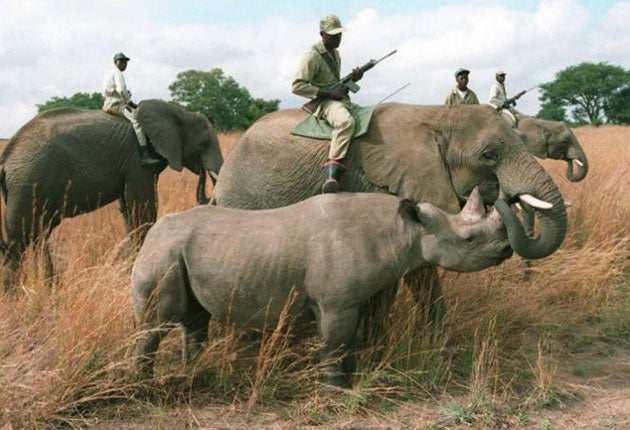Safari operators enraged as Zanu-PF rewards the faithful with stolen share of lucrative trade

Your support helps us to tell the story
From reproductive rights to climate change to Big Tech, The Independent is on the ground when the story is developing. Whether it's investigating the financials of Elon Musk's pro-Trump PAC or producing our latest documentary, 'The A Word', which shines a light on the American women fighting for reproductive rights, we know how important it is to parse out the facts from the messaging.
At such a critical moment in US history, we need reporters on the ground. Your donation allows us to keep sending journalists to speak to both sides of the story.
The Independent is trusted by Americans across the entire political spectrum. And unlike many other quality news outlets, we choose not to lock Americans out of our reporting and analysis with paywalls. We believe quality journalism should be available to everyone, paid for by those who can afford it.
Your support makes all the difference.Senior officials in Robert Mugabe's Zanu-PF party are forcing safari operators to give up the profits from lucrative ranches in a ruthless takeover of Zimbabwe's foreign-owned properties reminiscent of the regime's previous seizure of white farmers' land.
The officials include a provincial governor, Titus Maluleke, and the Environment Minister and UN appointee, Francis Nhema. They have compelled safari operators in the Save Valley Conservancy, a thriving wildlife reserve, to cede shareholdings from 50 to 80 per cent to allies in the police and military, as well as party apparatchiks. One investor described the confiscation as a "mafia-style takeover". Mr Mugabe is thought to have been told of the matter last week, when it was also discussed in a cabinet meeting.
The moves are a further example of the Mugabe regime's continued primacy in Zimbabwe, and underline the difficulties Morgan Tsvangirai's Movement for Democratic Change has faced in its attempts at reform. The country's wildlife lobby has warned that the property grab could render futile the attempts by the government of national unity to revive tourism, an ailing industry that Zimbabwe desperately needs to encourage as part of its attempt at economic revival.
The investors include Italian, American, Dutch and South African nationals. Mr Nhema convened a meeting with safari operators last week and warned them against resisting the move.
The news first came to light in an investigation by The Zimbabwean, a UK-based newspaper for Zimbabweans in exile. One foreign safari operator who had been forced to cede his shareholding told the newspaper: "If you attack wildlife, you are attacking your national herd, you are attacking your national heritage. When you attack the properties of foreigners, you are endangering the recovery of the country as a whole."
Among many examples is that of Governor Maluleke, who pulled up at Humani Safari Ranch and told the owner that his new partners were now demanding their share. Major General Engelbert Rugeje, the Chief of Staff of the Zimbabwe National Army, and Ailess Baloyi, a Zanu-PF MP, have since taken over a 50 per cent shareholding without any compensation. One of the operators who has been forced to share his company said: "This is obviously payoff for the [Zanu-PF] guys that have been faithful, all the guys who think they can muscle their way in."
The moves have been defended by Mr Nhema, who is also chairman of the UN Commission on Sustainable Development, as redistribution of property to its rightful owners. But while the operators acknowledge that their businesses are profitable, they point to the heavy investments they have had to make. One of the operators has pumped US$8m into his conservancy.
Another safari operator described the moment when Mr Nhema bluntly told him that he was going to have to give up a share of his business. "He just gets you into a room and says, 'Meet your partners'," he said. "You say, 'What do you mean? I don't need partners.' And they say 'I told you, you are going to get new partners. You sort it out yourself.'"
There has been particular incredulity among the victims – who are reluctant to be named for fear of drawing reprisals – at the role played by Mr Nhema, given his position with the UN. "You would think he would be the one policing this," one said.
Mr Nhema insisted that the actions were not aimed at rewarding allies. "We have always maintained that blacks have been sidelined from the lucrative business of running conservancies," he said. Asked to comment on the beneficiaries, the Environment Minister said they were the only people on the waiting list.
Join our commenting forum
Join thought-provoking conversations, follow other Independent readers and see their replies
Comments